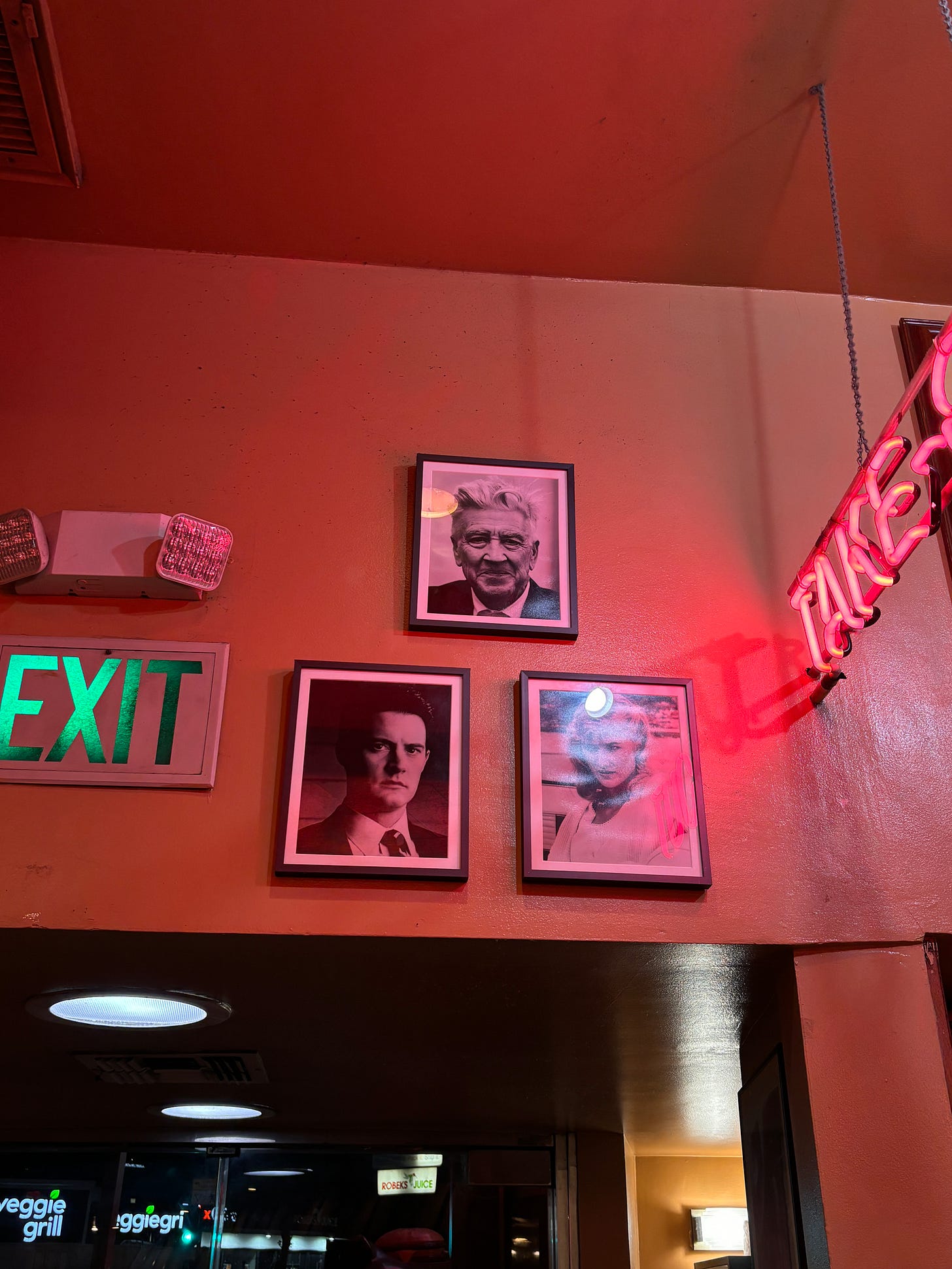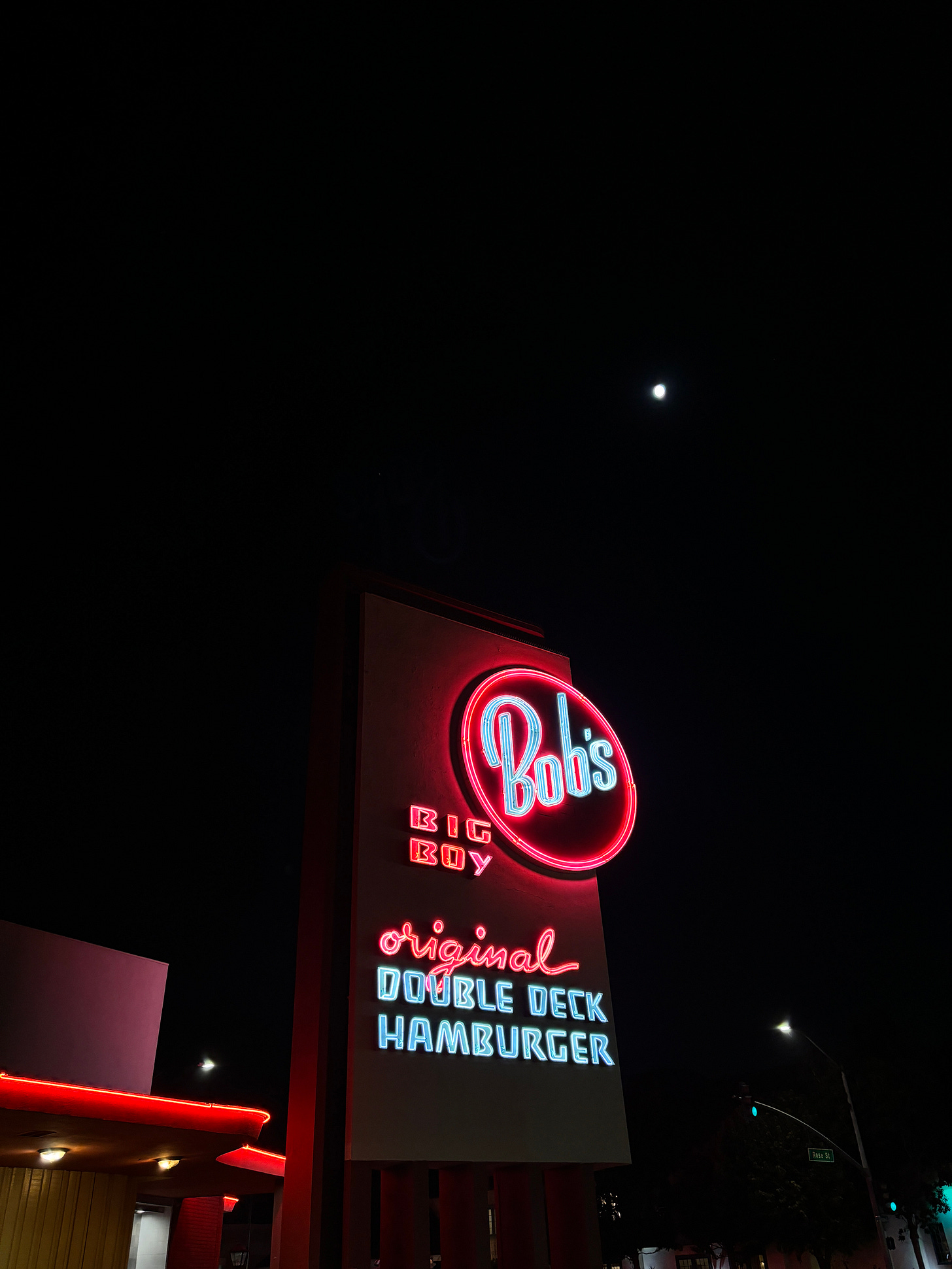In October, not long after David Lynch announced he had emphysema and would no longer be able to direct in person, Karl and I took a pilgrimage.
Karl had never been to an all-American diner but had always wanted to. The fulfilment of this fantasy had to happen somewhere special, somewhere with an all-American history and greasy booths. It had to, in the end, be Bob’s Big Boy. Not just any Bob’s Big Boy, but the original “restaurant” in Burbank.
After a pretty filling dinner with a friend, we drove to Burbank for round two. We had seen the Big Boy himself a few times driving to a friend’s in Toluca Lake, and he’s striking even from the road. Bob’s is integral to Los Angeles history, and that is partly down to Lynch. As legend has it, he went there every single day for seven years at 2:30pm. He would order a milkshake in a silver goblet and tons of coffee and he would scribble, for hours, on napkins. He would take meetings in their booths, including a “chemistry lunch” with Laura Dern and Kyle MacLachlan while casting Blue Velvet.
Now, not to diagnose the dead, but David Lynch was pretty obviously what I would call “one of mine”. There was the whole Bob’s Big Boy thing itself. The Woody Woodpecker thing. That video of him freaking out over a noise on set. The “perfect pair of pants” thing. Everything that ever came out of his mouth. Kyle MacLachlan’s beautiful tribute, in which he said that Lynch often struggled to answer questions about his work and that his distrust of words created a “unique challenge” that he got around with his own “peculiar way” of speaking to his actors. The movies themselves, the worlds he built, the way he wrote dialogue. I have always been drawn to not only Lynch’s movies but the parts of myself I could see reflected back in Lynch the man.
I took both an undergraduate and Master’s degree in Film Studies. That gave me a lot of time to read about David Lynch, to learn about him, and to watch his films. It also gave me a lot of time to hear a lot of really stupid opinions. We learned about directors who had such a singular vision they would grind their actors down to achieve it: Lars Von Trier, Alfred Hitchcock, David Fincher. We heard about Quentin Tarantino just having to strangle Diane Kruger himself because it wouldn’t look right if he didn’t. It always struck me that it was more often than not women that were being ground down and humiliated to achieve some guy’s “vision”.
It was often implied that this was just part of their genius. They were obsessive, fastidious, precise to the point of being cold. These were qualities that fascinated me, but I never understood why these directors could not have faith in the actors they had chosen. Why was cruelty a prerequisite of fastidiousness? Could you not coax a good performance out of a woman with patience? Could you not be obsessive about your work while being kind?
David Lynch could. His actors loved him, his crew loved him, random people on set loved him. Women loved him. They flocked to him, in part because he was very handsome. Lynch’s women have a harder time on-screen than they did on set–they are often beaten, assaulted, raped. The way that this violence is handled gives it a weight and the woman sentience and autonomy that is rarely seen. I can be sensitive, and there are screenings I didn’t stick around for at university (I will never waste time watching Irreversible) but David Lynch always handled violence in a way that made it feel like he was on my side. More than that, he taught me that you could be obsessive about your craft without removing yourself from the world. You could be a little strange without alienating everyone.
His kindness, his rejection of cynicism, his absolute sincerity, his respect, his humour. These are the things that enamoured me to David Lynch a couple of decades ago. The first film of his I saw was Eraserhead, which is a baptism by fire. There are easier ways in. But I was hooked, and the more I watched and the more I read the more I knew I would be for life.
It was the man David Lynch seemed to be that really moved me. There are threads of his compassion and love of life throughout his work, particularly Twin Peaks. I am a soft person, and it is hard to live in a harsh, loud, violent world that wants to beat tenderness out of you. I saw that understood in David Lynch’s work, and I felt like it saw me back. Seeing how people have responded to Lynch in the days after his death make me feel like there is space still in this world for aching, vulnerable sincerity.
Many of my favourite memories involve David Lynch: going to a Twin Peaks party in Brighton at 21 and getting so drunk it felt like entering the actual Black Lodge, watching Mulholland Drive at the Prince Charles, listening to Angelo Badalamenti with a friend while we tried to summon ghosts. Late at night, Karl and I would go to sites in Los Angeles that he had referenced or filmed, like the Snow White cottages and Mulholland Drive. He influenced the way I moved through the world, the things I wanted to see and understand. He saw Los Angeles and the world around it for exactly what they are without being worn down or becoming cynical with age. That is so rare.
That night, after eating onion rings and drinking cherry cokes and buying stickers at Bob’s Big Boy, we took a detour home up Mulholland Drive. I looked up David Lynch’s address, which is not something I would usually do, but it felt right. We drove past, slowly enough to see that the lights were on late at night. I am grateful for all of the tools for living that David Lynch leaves me with, but I cannot bear the thought that the lights might not be on anymore.






